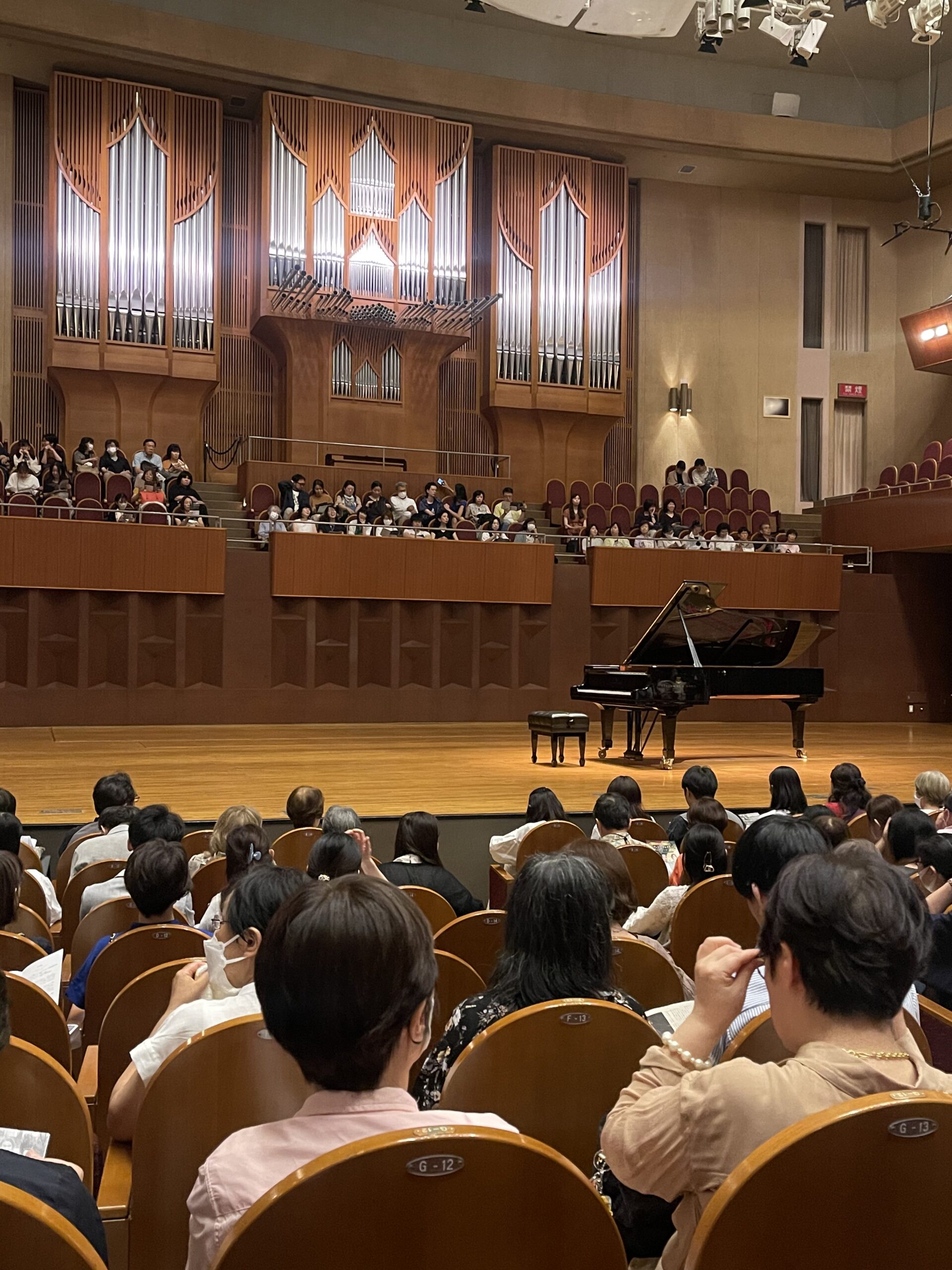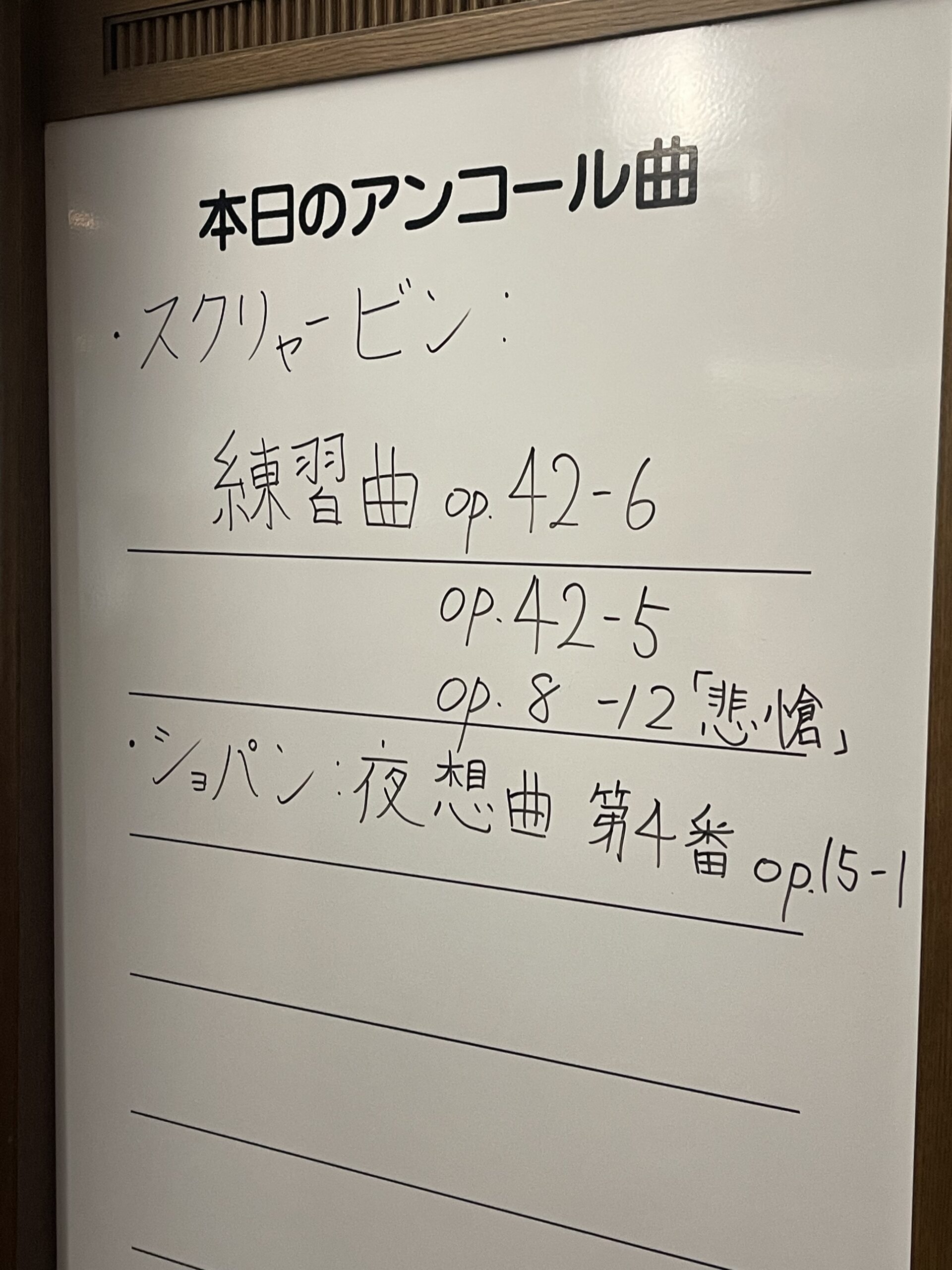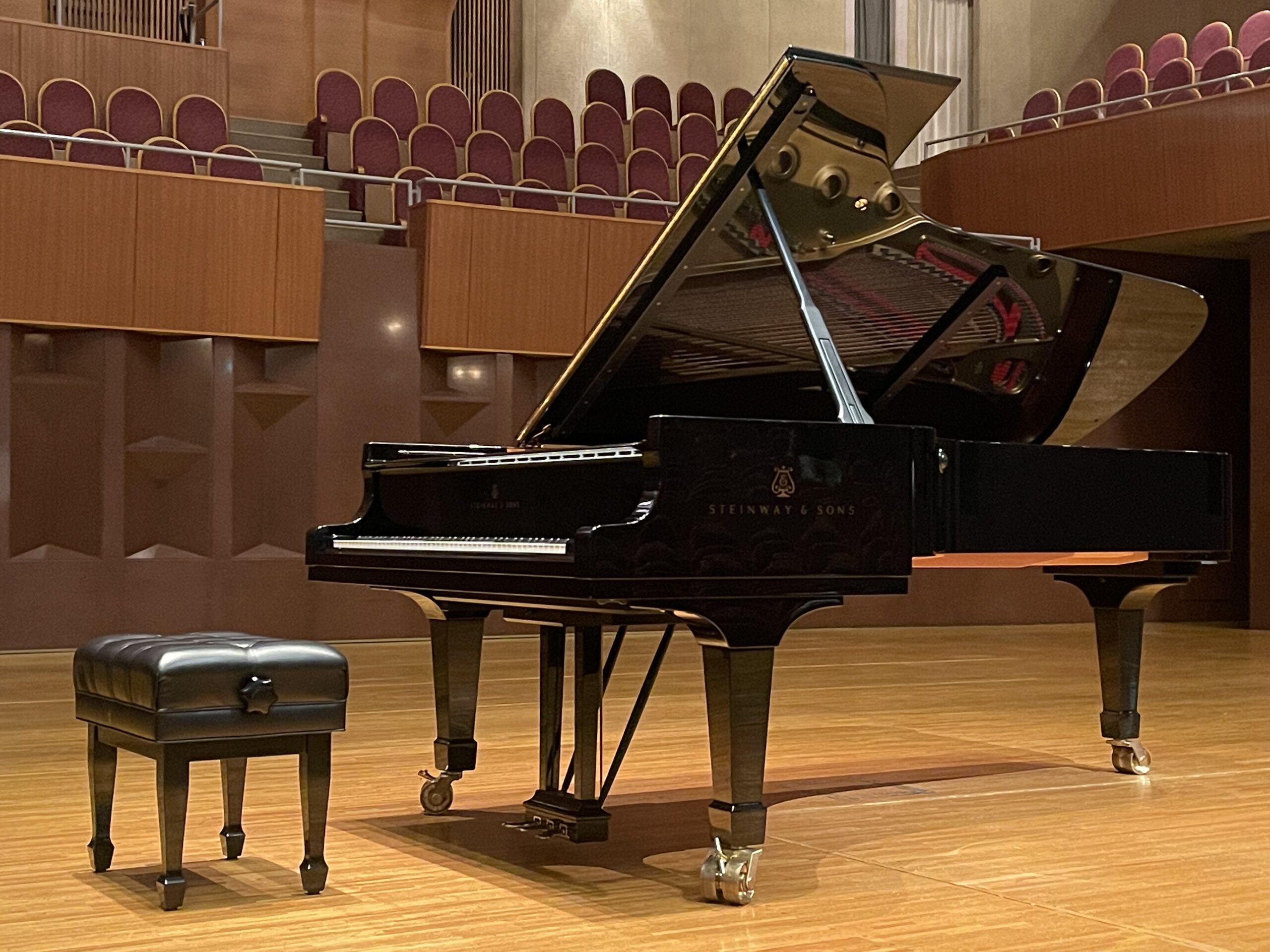2024 7/15
大阪のシンフォニーホールで行われた、アレクサンダー・ガジェヴさんの日本公演最終日に行ってきました!
演奏の前に、ガジェヴさんからのメッセージがあるとアナウンスが流れました。メッセージの要旨は、日常生活が忙しく、音楽や音にじっくりと耳を傾ける機会が減っている中、今この時間は音に集中しようというものでした。そして、演奏前に会場が2分間真っ暗になり、静寂を味わうことが提案されました。
このアイデアには感心しました。ガジェヴさんがショパンコンクールでヨガをしていた写真が公開されていましたが、これはヨガの呼吸や瞑想と通じるものがあります。一人一人が静寂を意識し、呼吸を整えた後に聞く繊細な音楽は、確かに違った響きを持つでしょう。
私はピアノリサイタルに行くたびに、音を立てる人々に対して「もったいないからやめて」と思います。このレベルのピアニストの演奏をただ聞き流すだけではもったいないのです。小さな音の響きや休符、静寂の後に訪れる音色に神経を集中させることで、聴衆も緊張感を持ち、一体感が生まれ、計算されたダイナミックな演奏がさらに輝きを増します。
静寂はクラシック音楽を楽しむ上で不可欠です。このような長いメッセージがホールのトイレなどに貼られていたり、ピアニストから直接コメントされたりすれば、多くの人が意識するでしょうが、あまりに厳格にすると、満席が難しいクラシックの会場が赤字に繋がる可能性もあります。そうした中で、観客に静寂を意識させるこの演出は素晴らしいと感じました。目を閉じて非日常を感じている間に、彼がピアノの前に現れました。
この静寂の中から音がどのように入り込むか楽しみにしていましたが、予想外のことが起こりました。あまりに強制された静寂の後、観客は彼が一曲目を弾き始めると、解放されたかのように咳やガサガサ音が目立ちました。
2分も静寂を保てたのに、咳は仕方ないとしても、あのガサガサ音やプログラムの紙を触る音、なんとかならないものでしょうか。ホール側はあんなに紙を持たせる必要があるのでしょうか。。
ともかく、演奏前からガジェヴさんの音を聴く姿勢へのメッセージは非常に心に響きました。静かにしてくださいと言わず、抽象的な形で巧みに伝えてくれました。
演奏は、もちろんの事すごいテクニックと美しい音色で観客を魅了しました。プログラムの構成も見事で、最初から最後まで一つの曲のように美しくまとまっていました。特に後半のショパンのプレリュードからスクリャービンへの流れが自然で、極めて繊細な音のコントロールが際立っていました。テクニックに裏打ちされた「自然に聞こえる」という現象には圧倒されました。
ショパンのマズルカやプレリュードでは音色に酔いしれました。どこかの記事で、彼は即興的な演奏を目指していると読みましたが、ショパンレベルを即興的に「自然に聞こえる」ように弾くには、相当な技術が必要です。数年前にショパンコンクールで2位を獲得しただけあり、どんな難しい部分も難しく聞こえません。
ふわふわと流れる演奏の中、私が特に感銘を受けたのは、「間」の取り方の素晴らしさでした。この「間」により静寂が際立ち、その緊張感から次に何が現れるのかという期待感が生まれ、感動が押し寄せてきます。クラシックピアノを即興的にかつデュナーミクを効かせて演奏するには相当な技術が必要ですが、彼はそれを見事に成し遂げていました。
さらに、彼の演奏には奇妙な癖が全くありません。テクニックがあっても固定された癖があるピアニストは多い(私も含め。。笑泣)。クラシックを上手に演奏すると、演歌っぽくなったり、悪い意味で古風に感じることが多いのですが、彼の演奏は時代を感じさせません。コンテンポラリーな色合いの繊細に描かれた陶器のデザインのように、超繊細でお洒落なアート作品のように聞こえます。
私の語彙力ではこの感動を十分に伝えられないかもしれませんが、とにかく、彼はテクニックを巧みに繊細なアートに生かしています。変なところでゆっくりしたり、間違いそうなところでも盛り上げる部分は妥協せず、歌わせる部分では音量の調整が見事です。即興的でありながら、音の構成が極めて繊細です。ここがコンクールで上位に立つ要因だと思いますが、上手なピアニストはサラッと弾く一方で、この「サラッと」が単調にならないように「繊細に」音楽を作り上げています。
前半最後の曲に「英雄ポロネーズ」!中間のミレドシミレドシ♪の連続部分のテンポが超絶早い!ポロネーズは昔弾いたことがあるので、この部分で苦労した思い出が蘇りますが、彼は余裕で弾きこなしていました(笑)。ミレドシの後も休むことなくテンポが早い早い!ポロネーズでは音外しが目立っていましたが、彼のような本物のアーティストをミスの良し悪しだけで判断するのは無意味なことで。英雄ポロネーズは上手でもノクターンがいまいちなプロのピアニストは多い。形式ばった曲調が上手なピアニストは割と多い中、彼のようなピアニストには、もっと内面的な深みのあるソナタやバラード4、ノクターンをずっと聴いていたい。プレリュードを永遠に聴いていたいです。
今回、席が良かったこともあり、彼のペダル操作をよく観察できました。彼の美しい音とキレのあるデュナーミクは弱音ペダルの巧みな使い方にもありました。踏んでいる感を出さずに、自然に弱音楽でも芯があるように聞こえる。これはすぐにピアノで試してみたいです。
アンコールまでは音楽的な素晴らしさが多く見られましたが、アンコールではキレッキレのテクニックのスクリャービンからのショパンノクターンで4曲も弾きあげ、観客をスタンディングオベーションに導いてくれました。
アンコール曲の選び方もかっこよかったです。
芸術でお腹いっぱいにしてもらえました。
【プログラム】
リスト:詩的で宗教的な調べより第7曲「葬送」
ショパン:マズルカより
嬰ヘ短調 Op.6-1、ハ長調 Op.24-2、
嬰ハ短調 Op.50-3、イ短調 Op.68-2、
ハ長調 Op.56-2、嬰ハ短調 Op.63-3
ポロネーズ第6番「英雄」変イ長調 作品53
24の前奏曲 作品28より第23、22、18、13、10、2番
スクリャービン:ピアノ・ソナタ第9番「黒ミサ」変ホ短調 作品68
ベートーヴェン:エロイカの主題による変奏曲とフーガ 作品35
Alexander Gadjiev Piano Recital ♪
Today, I attended the final day of Alexander Gadjiev’s Japan tour at Symphony Hall in Osaka.
Before the performance, an announcement was made that Gadjiev had a message for the audience. The gist of his message was that in our busy daily lives, we often don’t take the time to really listen to music and sound, so he encouraged everyone to focus on the music during this time. He suggested experiencing silence by having the hall go completely dark for two minutes before the performance began.
I was impressed by this idea. A photo of Gadjiev doing yoga at the Chopin Competition had been released, and this moment of silence is akin to the breathing and meditation in yoga. By making everyone aware of the silence and taking a moment to regulate their breathing, the delicate music that follows can indeed resonate differently.
Whenever I attend a piano recital, I always feel that it’s a waste when people make noise. It’s such a pity to merely passively listen to the performance of a pianist of this caliber. By concentrating on the resonance of small sounds, pauses, and the timbre following silence, the audience can share a sense of tension, creating a unity that makes the calculated dynamics of the performance shine even more. Silence is essential for enjoying classical music. If such a lengthy message were posted in places like the hall’s restroom or directly commented on by the pianist, many people would become more conscious of it. However, if enforced too strictly, classical music venues, which already struggle to be fully booked, could face financial difficulties. Within this context, Gadjiev’s way of making the audience aware of silence was wonderful. While I closed my eyes and felt the extraordinary atmosphere, he appeared in front of the piano.
I was looking forward to how the sound would emerge from this silence, but something unexpected happened. After being forced into silence for so long, the audience seemed to release their pent-up tension with noticeable coughing and rustling sounds when he started playing the first piece. Though it’s understandable that coughing is unavoidable, the rustling of paper and program pages was quite disturbing. Did the hall really need to distribute so much paper?
In any case, Gadjiev’s message about the attitude of listening to music struck a chord with me. Instead of just asking for silence, he skillfully conveyed it in an abstract form.
The performance, of course, captivated the audience with incredible technique and beautiful tone. The program was masterfully structured, seamlessly flowing like a single piece from start to finish. The transition from Chopin’s Preludes to Scriabin was particularly natural, highlighting his extremely delicate control of sound. I was overwhelmed by the phenomenon of his playing sounding “natural” despite the technical prowess underpinning it.
I was especially impressed by his use of pauses, which heightened the silence, creating tension and a sense of anticipation for what would come next, resulting in waves of emotion. Playing classical piano with such improvisational dynamism requires immense skill, and he accomplished this beautifully.
Additionally, his performance lacked any peculiar habits. Many pianists, despite having technical prowess, exhibit fixed quirks (myself included…laugh and cry). Playing classical pieces well often results in an outdated or overly traditional feel, but his performance was timeless. It sounded like a highly refined contemporary art piece, delicate yet stylish, much like intricately designed porcelain. My vocabulary may not suffice to fully convey my impression, but suffice it to say, he masterfully uses his technique to create delicate art. His adjustments in volume, even in parts meant to be sung, were impeccable. His improvisational yet meticulously structured sound was extraordinary. This is what places him at the top in competitions: creating “smooth” but not monotonous music, with exquisite detail.
The tempo of the “Heroic Polonaise” section (mi-re-do-si, mi-re-do-si) was very fast! Having played the Polonaise myself in the past, I recall struggling with this part, but he played it with ease . The tempo remained brisk after mi-re-do-si, without a moment’s rest! While many professional pianists excel in formal pieces but falter in more introspective ones, I would love to hear more of his deep, internal pieces like sonatas and nocturnes, particularly the Ballade No. 4 and Prelude, endlessly.
I had a good seat this time, allowing me to closely observe his pedal technique. His beautiful sound and crisp dynamics were partly due to his skillful use of the soft pedal, making even the quietest music resonate with a core. I can’t wait to try this technique myself on the piano.
The encore, featuring brilliant technical pieces like Scriabin and Chopin’s nocturnes, led the audience to a standing ovation. His choice of encore pieces was also very cool. I was completely satiated by the artistic experience he provided.
Program:
Liszt: “Funérailles” from “Harmonies Poétiques et Religieuses” Chopin: Mazurkas
- Op. 6-1 in F-sharp minor
- Op. 24-2 in C major
- Op. 50-3 in C-sharp minor
- Op. 68-2 in A minor
- Op. 56-2 in C major
- Op. 63-3 in C-sharp minor Polonaise No. 6 in A-flat major “Heroic” Op. 53 Preludes Op. 28 Nos. 23, 22, 18, 13, 10, and 2 Scriabin: Piano Sonata No. 9 “Black Mass” in E-flat minor Op. 68 Beethoven: Variations and Fugue on a Theme by Eroica Op. 35




